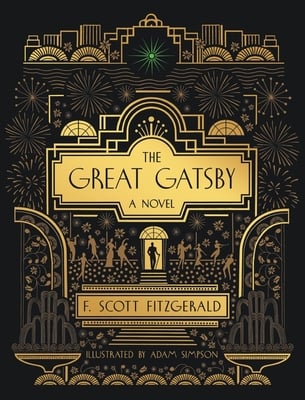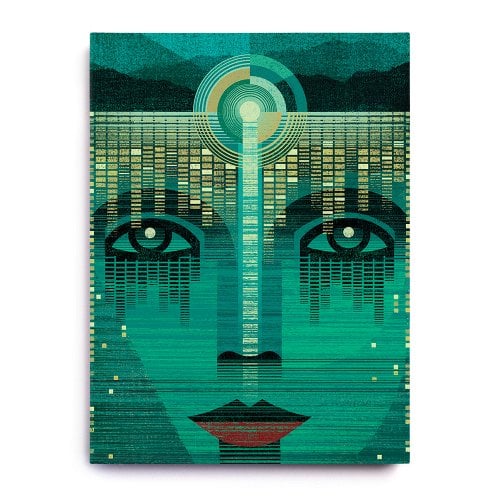When I was in high school, my American literature class studied F. Scott Fitzgerald’s The Great Gatsby (published 1925) for more than a month. After we read it, we read and discussed critical essays, we got in groups and planned papers, and then each of us wrote a paper that was at least five pages about the novel. It was quite an experience. Five pages for a high school student is quite long.
I liked the book. I ended up studying English in college so I got to write plenty more critical analyses of novels. Yet, I haven’t recalled a deep and abiding love for The Great Gatsby. Maybe because we spent too long on it? Reading it this week, however, was a true joy.
I think that The Great Gatsby is a perfect-sized novel for a high school student to analyses as a first “critical” read. It’s relatively short, and Fitzgerald writes a very clear story with vivid characters, and a clear progression from beginning to end. It is not a novel full of action, and yet Fitzgerald’s straight-forward prose invites the reader to keep going. I love Fitzgerald’s way with words. Even though it’s been more than 15 years since I read the novel the first time, I felt at home when I stumbled upon familiar phrases so integral to the developing story.
“I’m p-paralyzed with happiness.”
“Sophisticated — God, I’m sophisticated!”
“I hope she’ll be a fool—that’s the best thing a girl can be in this world.”
With every word she was drawing further and further into herself, so he gave that up, and only the dead dream fought on as the afternoon slipped away, trying to touch what was no longer tangible.
“I wouldn’t ask too much of [Daisy],” Nick warned. “You can’t repeat the past.” …. “as if the past were lurking here in the shadow of his house, just out of reach of his hand.”
He stretched out his hand desperately as if to snatch only a wisp of air, to save a fragment of the spot that she had made lovely for him. But it was all going by too fast now for his blurred eyes and he knew that he had lost that part of it, the freshest and the best, forever.
So we beat on, boats against the current, borne back ceaselessly into the past.
These memorable phrases probably don’t mean anything to people who haven’t read the book. Maybe they don’t even strike you as beautiful as they do to me, beautiful because they so wonderfully capture the essence of The Great Gatsby: hopeless discouragement hidden behind an illusion and unrequited love.
The Great Gatsby is a somewhat cynical look at vapid people in an era of wealth. It takes place during Prohibition, adding a surreptitious element to the alcohol-filled extravaganzas Gatsby provides at his mansion for the wealthy. Daisy, Gatsby’s unrequited love, is the quintessential flapper, and yet when her impression of Gatsby’s parties is negative, Gatsby too desires to change his approach.
What do the wealthy want? Gatsby can’t figure it out. I don’t think Daisy, Nick, Tom, or Jordan Baker knew either. The life of the wealthy is just so . . . tragic? hopeless? frustrating? lonely? What is Fitzgerald saying in this slim novel full of annoying people?
I know I’m not doing a good job of describing The Great Gatsby. I’m rather out of practice at reviewing fiction! But beyond that issue is the fact that I don’t know where to begin with The Great Gatsby. This reread proved to me that it’s a book to revisit. My 16-year-old self spent a lot of time examining the details of the novel (my paper was on Nick Carraway, who I really liked as a narrator).
Yet revisiting the novel 15 years later has shown me that there is lots more I could examine in it. Even Nick is far more complicated and less “honorable” than I recalled. I still can’t say I love it (the insipid life style, conversation, and annoying characters are simply not “loveable” material for me) and yet Fitzgerald’s style does work so well. The familiar phrases feel like old friends. It almost makes me want to revisit Tender is the Night to find the new friends that may be in Fitzgerald’s words.
Gatsby seems to me to be far more straight-forward than Tender: it’s clearly about Gatsby’s illusions, selfishness, and so forth. Yet everyone is more complex than first glance. Even Daisy, while pretty irritatingly selfish, may have some deeper layer. I’ll have to ponder them all a little more on my next read.








One of my favourite novels ever. Every time I read it, I think I discover a new lesson about life, love and ambition. However, I do agree it needs some critical studying to fully understand the novel as a whole, there are a lot of symbols hidden!
Oh and I admire Daisy “High in a white palace, the king’s daughter, the golden girl.” My favourite, most cherished quote and the only one I know by heart.
Elena » It’s definitely not a FAVORITE of mine but I think it says something for it’s quality that it can be approached on so many different levels because it appears so straight-forward and yet there is a lot in it.
Loved rereading the passages from the text you quoted. So lyrical! Great review.
Jessica » yes, it’s a very lyrically written book.
The Great Gatsby is one of my favorite books. Fitzgerald’s writing is gorgeous, and the story is so lovely and sad. I can’t say I like many of the characters (although I find Jordan very interesting), but Gatsby’s desperate, unrequited love for Daisy is really moving, and it’s heartbreaking that no one comes to Gatsby’s funeral. I think it shows the dangers and hollowness of excess; you can throw all the raging parties you want, but they won’t make you any less lonely or more fulfilled if you’re not making the human connections.
Leah » Interesting that you found Gatsby so moving. I really didn’t like Gatsby. I found him so self-centered it was ridiculous. But it was rather sad that in the end, no matter how hard he tried, no one did care about him 🙁